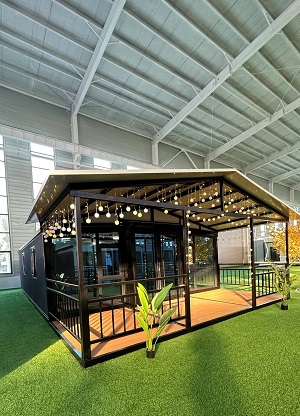Benefits and Advantages of Expandable Container Houses
2024-07-17
An expandable container house is a type of modular building constructed from shipping containers that can expand or unfold to create additional living or working space. These innovative structures offer flexibility, quick installation, and portability, making them suitable for various residential, commercial, and industrial applications. Here’s a detailed overview of expandable container houses:
Features and Design:
1. Container Base:
- Typically built using standard shipping containers (often 20-foot or 40-foot sizes) made from durable steel. These containers are robust, stackable, and designed for transportation.
2. Expandable Mechanism:
- Slide-Out Design: Some expandable container houses feature slide-out sections that extend from one or both sides of the container. This allows for additional interior space when expanded.
- Fold-Out Design: Another design incorporates folding panels or walls that expand to increase floor area. These panels can unfold horizontally or vertically, depending on the design.
3. Structure and Insulation:
- Containers are modified with insulation to improve thermal efficiency and comfort, ensuring suitable living or working conditions in various climates.
- Structural reinforcements may be added to accommodate the expansion mechanisms and maintain structural integrity.
4. Interior Layout:
- The interior layout can be customized to include living areas, bedrooms, bathrooms, kitchens, and storage spaces.
- Modular furniture and fixtures can maximize space efficiency and adaptability.
5. Installation and Portability:
- Expandable container houses are prefabricated off-site and transported to the location, reducing construction time and disruption.
- They can be transported by truck, ship, or rail, allowing for easy relocation if needed.
Benefits and Advantages:
- Speed of Construction: Quick assembly compared to traditional building methods, reducing labor costs and time.
- Versatility: Suitable for various applications such as residential homes, offices, classrooms, emergency shelters, and temporary housing solutions.
- Cost-Effective: Generally more affordable than conventional construction due to reduced materials and labor expenses.
- Sustainability: Upcycling used shipping containers reduces waste and provides a sustainable building solution.
Applications:
- Residential Use: Single-family homes, vacation cabins, or tiny houses for individuals or families seeking affordable housing solutions.
- Commercial Use: Offices, retail spaces, pop-up shops, and temporary event structures.
- Emergency and Humanitarian Aid: Quickly deployable shelters for disaster relief or temporary housing needs.
- Remote Locations: Ideal for off-grid living or remote work sites where traditional construction may be challenging.
Considerations:
- Permits and Regulations: Check local building codes and regulations regarding the use of shipping containers for construction.
- Utilities: Ensure access to utilities such as water, electricity, and sewage systems, especially in remote or off-grid locations.
- Maintenance: Regular maintenance is necessary to ensure the longevity and performance of the structure, including checking for rust, insulation integrity, and structural stability.
Expandable container houses offer a modern and flexible alternative to traditional building methods, combining sustainability with practicality. Their versatility and adaptability make them an attractive option for a wide range of residential, commercial, and humanitarian applications.



